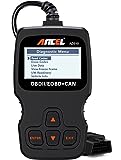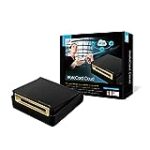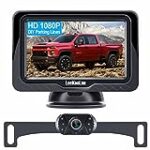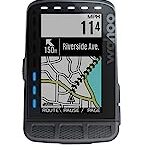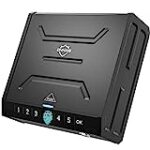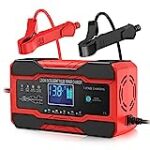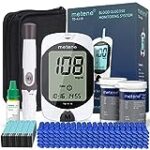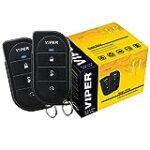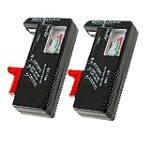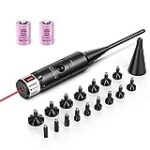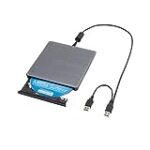🌅 Introduction
Welcome to our comprehensive guide on car diagnostic tools. Whether you’re an experienced mechanic or a DIY enthusiast, finding the best value diagnostic tool can be a daunting task. But fear not, as we’re here to provide you with the most reliable and affordable options on the market. With our expert insights and in-depth research, you’ll discover the perfect diagnostic tool to effectively and efficiently diagnose your vehicle’s issues. From OBD-II scanners to code readers, we’ve got you covered. So sit back, relax, and let us help you make an informed decision on the best diagnostic tool for your car.
🏆 Our Top 5
- CEL Doctor: The ANCEL AD310 is one of the best-selling OBD II scanners on the market and is recommended by Scotty Kilmer, a YouTuber and auto mechanic. It can easily determine the cause of the check engine light coming on, quickly read and clear diagnostic trouble codes, read live data & hard memory data, view freeze frame, I/M monitor readiness and collect vehicle information. Instead of taking car to mechanic shop, you can use it to check the trouble code and show code definition by yourself.
- Sturdy and Compact: Equipped with a 2.5 foot cable made of very thick, flexible insulation. It is important to have a sturdy scanner as it can easily fall to the ground when working in a car. The AD310 OBD2 scanner is a well-constructed mechanic tool with a sleek design. It weighs 12 ounces and measures 8.9 x 6.9 x 1.4 inches. Thanks to its compact design and light weight, transporting the device is not a problem. The buttons are clearly labelled and the screen is large and displays results clearly.
- Accurate Fast and Easy to Use: The AD310 scanner can help you or your mechanic understand if your car is in good condition, provides exceptionally accurate and fast results, reads and clears engine trouble codes in seconds. If you want to find out the cause of the check engine light, this device will let you know immediately and fix the problem right away without any car knowledge. No need for batteries or a charger, get power directly from the OBDII Data Link Connector in your vehicle.
- OBDII Protocols and Car Compatibility: Many cheap scan tools do not really support all OBD2 protocols. This is not the case with the AD310 scanner as it can support all OBDII protocols such as KWP2000, J1850 VPW, ISO9141, J1850 PWM and CAN. This device also has extensive vehicle compatibility with 1996 US-based, 2000 EU-based and Asian cars, light trucks, SUVs, as well as newer OBD2 and CAN vehicles both domestic and foreign. Check compatibility with your vehicle model before purchasing.
- Home Necessity and Worthy to Own: This is an excellent code reader to travel or home with as it weighs less and it is compact in design. You can easily slide it in your backpack as you head to the garage, or put it on the dashboard, this will be a great fit for you. The AD310 is not only portable, but also accurate and fast in performance. Moreover, it covers various car brands and is suitable for people who just need a code reader to check their car.
- [Pro OBD2 Scanner] - BlueDriver is the easiest way to scan and understand your vehicle like a professional mechanic. Read and clear your car’s trouble codes and check engine light.
- [Read & Clear All The Codes] - BlueDriver's enhanced vehicle diagnostics gives you access to information normally available only to mechanics on their OBD2 scan tools. Now you can read and clear ABS, Airbag, SRS, TPMS codes, and many more.
- [Get The Right Fix & View Live Data] - Much more than a car code reader, BlueDriver is a diagnostic tool. You’ll get unlimited repair reports with possible causes and fixes, plus real-time health monitoring while you drive with the live data feature.
- [Wireless & Bluetooth Enabled] - Say goodbye to wires. BlueDriver connects with Bluetooth via your phone/tablet to a sensor that plugs into your car's OBDII port. Get all of the capabilities of an expensive code reader & scan tool without any annoying wires.
- [User-Friendly App and Repair Videos] - BlueDriver gives you more ways to scan and fix your vehicle. Our iOS & Android app connects you to a large database of repair videos with step-by-step directions of repairs.
- Multi-Function: This code reader for cars and trucks is like a micro mechanic, which can quickly read and clear engine error codes, live data stream (with graphic display), view freeze frame, check MIL readiness status, read I/M monitoring readiness status and collect vehicle information, display vehicle indicators in detail. You can use it to check fault codes by yourself and display code definitions, understand the health of the vehicle, be fully prepared for going to the auto repair shop for car maintenance.Note: It cannot detect battery life, gearbox faults, output current test, can only detect battery voltage, and can clear fault codes of repaired vehicles.ABS code is not supported.
- Wide Vehicle Compatibility: Multiple Uses - The OBD2 professional automatic scanner supports all OBDII protocols such as KWP2000, J1850 VPW, ISO9141, J1850 PWM and CAN.Works with most 1996 and newer US cars, 2000 EU and Asian cars, light trucks, SUVs, and newer OBD2 and CAN vehicles both at home and abroad. Please check compatibility with your model before purchasing. This car code reader supports multiple languages such as English, German, French, Spanish, Finnish, Dutch, Russian and Portuguese, making it an ideal choice for international users, deeply loved and highly recommended by customers worldwide.
- Rugged and Compact Design: The OBD2 scanner is a compact and well-designed car parts. It weighs 12 ounces and measures 8.9 x 6.9 x 1.4 inches. It comes with a 2.5-foot heavy-duty cable with a standard 16-pin OBD connector. The cable is made of a very thick flexible insulation layer and is sturdy and durable. Since OBD2 scanners can easily fall to the ground while working in the car, the structural design of the scanner is very demanding, and this OBD2 scanner can well meet the customer's needs for sturdiness and compactness.
- Accurate, Fast and Worth Having: The OBD2 code reader adopts an upgraded microprocessor, its powerful performance provides fast and accurate results and displays them on the screen, draws and records real-time vehicle sensor data, helps you understand the condition of the car, quickly diagnose and repair common car problems. 6 buttons for quick operation, plug-and-play design makes it easy to use, you can easily operate it without reading the manual. The OBD2 scanner is not only designed to be lightweight and portable, but also simple, accurate and fast to operate, affordable and more cost-effective, it is a must-have tool for home DIY diagnosis or mechanics to use in auto repair.
- Battery Tester and Advanced OBDII System Diagnostics: This advanced code reader with battery has a built-in easy-to-use battery tester for monitoring battery life and voltage, helping you quickly assess the battery health of your vehicle, prevent unexpected failures and ensure reliable car performance. At the same time, this engine fault code reader provides advanced diagnostic functions, including testing the O2 sensor and EVAP system to measure oxygen concentration, control the amount of fuel injection, reduce fuel consumption, maintain optimal combustion conditions, improve engine efficiency; reduce exhaust emissions, and better protect the environment.
- Multi-Functions - Practical Multi-Functions OBD2 code reader features built-in OBD2 DTC lookup library, which help you to determine the cause of the engine light, read code, erase code, view freeze frame, I/M ready, vehicle information, data flow, real-time curve, get vehicle speed information, calculate load value, engine coolant temperature, get engine speed.
- Wide Capability - Supports 9 protocols compatible with most 1996 US-Based, 2000 EU-Based and Asian cars, and newer OBD II & CAN domestic or import vehicles. Supports 6 languages - English,German, Dutch, Spanish, French, Italian.
- 2.8" LCD Display - Designed with a clear display 2.8" Large LCD screen - white backlight and contrast adjustment. No need any battery or charger, OBD reader gets the power directly from your vehicle through the OBDII Data Link Connector.
- Compact Design - Car diagnostic scanner is equipped with a 2.5 feet long cable and made of a very thick flexible insulator.There are 6 buttons on OBD2 Scanner:scroll up/down,enter/exit and buttons that quick query VIN vehicle number& the DTC fault code.
- ABS / Airbag codes NOT Supported - It is able to read and clear check engine information which is part of OBDII system, but it cannot work with non-OBDII systems, including ABS / Airbag / Oil Service Light, etc.
- Powerful Check Engine Light Diagnostics — Read and diagnose your check engine light, understand the severity of the issue, and clear that pesky light from your vehicle. FIXD translates your vehicle into simple English, empowering you to make the easy fix in many cases & saving you precious time. FIXD also saves you money by providing you with estimated repair costs up-front, allowing you to feel more confident during those trips to the mechanic
- The Trusted Choice — FIXD is the professional choice proudly designed in the USA by Professional Engineers and ASE Certified Mechanics. Get unlimited access to over 10,000 manufacturer specific and enhanced trouble codes (ABS, Airbag, TPMS, and Transmission*). With the App, you'll have freeze frame data, live diagnostic data, and proactive vehicle maintenance reminders at your fingertips. All the capabilities of an expensive Scan Tool at a fraction of the cost
- Easy & Intuitive — The powerful FIXD OBD-II Diagnostic Sensor and the professionally designed FIXD App are the perfect pair. The FIXD Code Reader is light & compact, remaining out-of-sight during your drive. The FIXD Sensor connects to the FIXD App via Bluetooth in seconds, providing you with a suite of resources easy enough for anyone to use
- We've Got You Covered — The FIXD OBD 2 Scan Tool is compatible with all gas-powered vehicles made after 1996 (no all-electric or diesel) and works with all vehicle protocols. Works with iPhone, iPad, and Android devices
- Go further with FIXD Premium— Upgrade your in-app experience with: Cost and repair estimates from the Identifix database, Unlimited calls to our FIXD Mechanic Hotline for a trusted second opinion and DIY help from our network of ASE certified mechanics, And much more! FIXD Premium is a monthly subscription that is optional and is not required for use of the sensor
🤔 How to choose?
1. Types of Car Diagnostic Tools
There are several types of car diagnostic tools available in the market, each offering different features and functionalities. It is important to understand the different types before making a purchase decision.
OBD-II Scanners: These scanners are the most common and widely used car diagnostic tools. They are designed to read and clear engine codes, monitor vehicle sensors, and provide real-time data on various parameters such as fuel efficiency, engine temperature, and more.
Professional Diagnostic Tools: These tools are more advanced and cater to professional mechanics and technicians. They offer a wider range of functionalities, including the ability to diagnose and troubleshoot complex issues in multiple systems of the vehicle, such as ABS, airbag, transmission, and more.
Bluetooth and Wi-Fi OBD-II Adapters: These adapters connect to your smartphone or tablet via Bluetooth or Wi-Fi and provide access to diagnostic information through specialized apps. They are portable, user-friendly, and offer real-time data streaming.
2. Compatibility and Vehicle Coverage
One of the most crucial factors to consider when choosing a car diagnostic tool is its compatibility with your vehicle. Not all tools are compatible with all car models and manufacturers. **Before purchasing, check the tool’s specifications and ensure it covers your specific vehicle make and model**.
Some diagnostic tools have a broader vehicle coverage, while others are more limited. For example, if you own a European car, it is essential to choose a tool that has comprehensive coverage for European vehicle models. **Consider your specific needs and choose a diagnostic tool that covers all the systems and modules of your vehicle**.
3. Ease of Use
A car diagnostic tool should be user-friendly and easy to navigate. Whether you are a professional mechanic or a car enthusiast, you should be able to use the tool without any technical difficulties. Look for a tool with a clear and intuitive interface, easy-to-understand menus, and straightforward navigation. **Read customer reviews and ratings to gauge the user-friendliness of a particular diagnostic tool**.
4. Additional Features
While the primary purpose of a car diagnostic tool is to diagnose and troubleshoot issues, many models offer additional features that can enhance your overall car maintenance experience. Some tools provide access to a vast database of repair information, technical service bulletins, wiring diagrams, and more. Others offer live data streaming, graphing capabilities, and even the ability to perform specific service functions. **Consider your needs and prioritize the additional features that will be most valuable to you**.
5. Price and Warranty
Car diagnostic tools range in price from budget-friendly options to high-end professional scanners. When it comes to choosing the right tool, it is essential to strike a balance between the features and functionality you need and your budget constraints. **Compare prices across different brands and models while considering the reputation and reliability of the manufacturer**. Additionally, always check the warranty provided by the manufacturer to ensure that you are protected against any potential defects or malfunctions.
💡 What to Look for in a car diagnostic tools?
1. Compatibility
When choosing a car diagnostic tool, compatibility is key. Make sure that the tool you are considering is compatible with your specific make and model of vehicle. Some diagnostic tools are designed to work with a wide range of vehicles, while others are more limited in their compatibility. It is important to check the product specifications or consult with a sales representative to ensure that the tool you choose will work with your vehicle.
For example, if you own a BMW, you would want to make sure that the diagnostic tool you choose is compatible with BMW models. One popular diagnostic tool that offers compatibility with various makes and models is the Autel MaxiCOM MK808. This tool is designed to work with over 80 vehicle brands, including BMW, Mercedes-Benz, and Audi.
2. Functionality
The functionality of a car diagnostic tool is another important factor to consider. Different tools offer different features and capabilities, so it is important to determine what specific functions you need. Some diagnostic tools are basic and only provide basic code reading and clearing capabilities, while others offer advanced diagnostic functions such as live data streaming, component testing, and comprehensive system scans.
For example, if you are a professional mechanic, you may require a more advanced diagnostic tool that can provide in-depth diagnostic information and perform advanced functions. On the other hand, if you are an average car owner who only needs to diagnose basic engine issues, a simpler tool with basic code reading capabilities may be sufficient.
3. Ease of Use
One often overlooked factor when purchasing a car diagnostic tool is ease of use. It is important to choose a tool that is user-friendly and does not require extensive technical knowledge to operate. Look for a tool with a simple and intuitive interface, clear instructions, and easy navigation.
A good example of an easy-to-use diagnostic tool is the BlueDriver Bluetooth Professional OBDII Scan Tool. This tool connects wirelessly to your smartphone or tablet, allowing you to easily diagnose and monitor your vehicle’s performance. The BlueDriver app provides step-by-step instructions and user-friendly graphics to guide you through the diagnostic process.
In conclusion, when choosing a car diagnostic tool, it is important to consider compatibility, functionality, and ease of use. By carefully evaluating these factors, you can find a tool that meets your specific needs and helps you diagnose and resolve vehicle issues effectively.
🔍 How we picked?
1. Extensive Research and Testing
In order to provide you with the most accurate and reliable information, our team conducted extensive research and testing on a wide range of car diagnostic tools. We scoured various online platforms, expert reviews, user feedback, and conducted hands-on testing to ensure that we are recommending the best products available. Our goal was to find car diagnostic tools that are user-friendly, accurate, durable, and offer a wide range of features.
During the testing phase, we evaluated the performance of each tool by connecting it to different types of vehicles and analyzing its ability to accurately diagnose various issues. We paid close attention to factors such as speed, ease of use, compatibility, and the amount of information provided. Through this rigorous process, we were able to identify the top car diagnostic tools that will meet the needs of both professional mechanics and DIY enthusiasts.
2. User Reviews and Feedback
We value the opinions and experiences of real users, as they provide valuable insights into the performance and reliability of car diagnostic tools. To understand how these tools perform in real-world scenarios, we analyzed hundreds of user reviews and feedback from various online platforms and forums. This allowed us to gather important feedback on aspects such as accuracy, compatibility, ease of use, and customer support.
One user, for example, praised a particular diagnostic tool for its ability to accurately identify a faulty oxygen sensor in their vehicle, saving them time and money on unnecessary repairs. Another user highlighted the durability and reliability of a different tool, which proved to be essential for their regular vehicle maintenance. These insights from real users helped us in our decision-making process and ensured that the tools we recommend are truly effective and reliable.
3. Price and Value for Money
We understand that price is an important factor when it comes to purchasing car diagnostic tools. That’s why we carefully considered the price range of each tool and compared it to its features and performance. Our aim was to recommend tools that provide excellent value for money, offering a balance between affordability and functionality.
For example, we found a budget-friendly diagnostic tool that performs exceptionally well, providing accurate and detailed information at a fraction of the cost of higher-end models. On the other hand, for those looking for more advanced features, we also identified premium diagnostic tools that offer an extensive range of functions and capabilities, justifying their higher price tag. By considering price along with performance, we ensured that our recommendations cater to a wide range of budgets and needs.
Through our meticulous research, testing, and analysis of user reviews, our team has handpicked the best car diagnostic tools on the market. We are confident that our recommendations will help you diagnose and troubleshoot any issues with your vehicle effectively, saving you time, money, and frustration. So, let’s dive into the world of car diagnostic tools and find the perfect one for you!
💬 Frequently asked questions about car diagnostic tools
1. What is a car diagnostic tool and why do I need one?
A car diagnostic tool is a device that connects to your vehicle’s onboard computer system and identifies any issues or malfunctions. It provides detailed information about the health of your car, including error codes, sensor data, and performance metrics. Whether you are a professional mechanic or an enthusiastic DIYer, owning a car diagnostic tool is crucial for identifying and resolving problems with your vehicle.
2. What are the different types of car diagnostic tools available?
There are numerous car diagnostic tools on the market, varying in complexity and functionality. The most common types include handheld scanners, OBD-II adapters, and software-based solutions. Handheld scanners provide a portable and user-friendly option, while OBD-II adapters allow you to connect your smartphone or tablet to your car’s computer system. Software-based solutions, on the other hand, offer extensive diagnostic capabilities using a laptop or PC.
3. How do I choose the right car diagnostic tool for my needs?
Choosing the right car diagnostic tool depends on your specific requirements and expertise. Consider factors such as compatibility with your vehicle’s make and model, ease of use, and the diagnostic features you need. If you are a professional mechanic, investing in a more advanced tool with live data streaming and graphing capabilities would be beneficial. Alternatively, if you are a DIYer, a basic scanner that displays error codes and provides brief explanations may suffice.
4. Can I use a car diagnostic tool if I’m not a trained mechanic?
Absolutely! Car diagnostic tools are designed to be user-friendly, and many come with intuitive interfaces and built-in help features. They provide error codes and descriptions that can be easily researched online. Additionally, some tools offer comprehensive databases with repair solutions, making it easier for non-mechanics to diagnose and fix issues. With the availability of online forums and communities, you can also seek guidance from experienced car enthusiasts who have faced similar problems.
5. Is it worth investing in a high-end car diagnostic tool?
While high-end car diagnostic tools may come with a higher price tag, they often offer advanced features that can be invaluable for professional mechanics. These tools provide real-time data, advanced troubleshooting capabilities, and a broader range of diagnostic tests. They can diagnose complex issues that basic scanners may overlook. However, for occasional users or DIYers, a mid-range diagnostic tool may provide sufficient functionality at a more affordable price point.
Remember, **choosing the right car diagnostic tool is the key to efficiently diagnose and resolve issues**. Consider your needs, do thorough research, and read reviews to ensure you make an informed decision. Whether you are a professional mechanic or a DIYer, a car diagnostic tool will save you time, money, and frustration by pinpointing problems accurately and allowing you to tackle them with confidence.
Last update on 2025-07-26 / Affiliate links / Images from Amazon Product Advertising API
